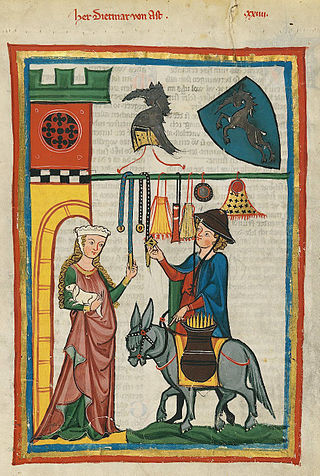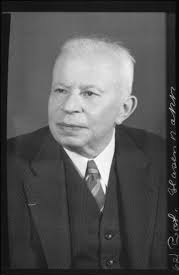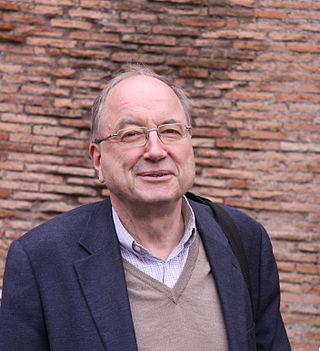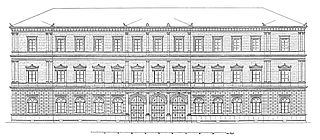Related Research Articles
Studien zu den Bogazköy-Texten edited by the German Akademie der Wissenschaften und der Literatur, Mainz, since 1965, is a series of editions of Hittite texts and monographs on topics of the Anatolian languages. The series was intended to publish the Hittite texts that were excavated at Hattusa.

Dietmar von Aist was a Minnesinger from a baronial family in the Duchy of Austria, whose work is representative of the lyric poetry in the Danube region.

Herbert Hunger was an Austrian Byzantinist, palaeographer and university professor. He was an influential specialist in Byzantine literature, particularly of the secular vein.
Alan Isler was an English-American novelist and professor. He left his native England for the United States at age 18, served in the US Army from 1954 to 1956, received a doctorate in English Literature from Columbia University and taught Renaissance Literature at Queens College, City University of New York from 1967 to 1995. In 1994 he won the National Jewish Book Award and the JQ Wingate Prize for his first novel “The Prince of West End Avenue”, which was also a finalist for the National Book Critics Circle Award. He has subsequently published four other works: “Kraven Images” (1996); “The Bacon Fancier”, also known as “Op.Non.Cit.”, (1999); “Clerical Errors” (2002); and “The Living Proof” (2005).
Hans Diller was a German classical scholar and historian of ancient Greek medicine.
Ilse Schwidetzky was a German anthropologist.

The Mokṣopāya or Mokṣopāyaśāstra is a Sanskrit philosophical text on salvation for non-ascetics, written on the Pradyumna hill in Śrīnagar in the 10th century. It has the form of a public sermon and claims human authorship and contains about 30,000 śloka's. The main part of the text forms a dialogue between Vasiṣṭha and Rāma, interchanged with numerous short stories and anecdotes to illustrate the content. This text was later expanded and vedanticized, which resulted in the Yogavāsiṣṭha.
Karl Marienus Deichgräber was a German classical philologist. Deichgräber was a member of the Nazi Party.
Hermann von Wissmann was a German-Austrian explorer of Arabia.
Friedrich Wilhelm Karl Ritter von Hegel was a German historian and son of the philosopher Georg Wilhelm Friedrich Hegel. During his lifetime he was a well-known and well-reputed historian who received many awards and honours. He was one of the major urban historians during the second half of the 19th century.

Otto Max Helmuth von Glasenapp was a German Indologist and religion scholar specialized as a historian of Indian philosophy, who taught as a professor at the University of Konigsberg in East Prussia (1928–1944) and Tübingen (1946–1959). He was a member of several academic and literary institutions in post-war Germany, including the Akademie der Wissenschaften und der Literatur, Deutsche Akademie für Sprache und Dichtung, and PEN Centre Germany.

Henner von Hesberg is a German classical archaeologist.
Wolfram Steinbeck is a German musicologist.
Albrecht Riethmüller is a German musicologist.
Kurt von Fischer was a Swiss musicologist and classical pianist.
Martina Wagner-Egelhaaf is a Senior Professor at the University of Münster, Germany. She was a Professor of German Literature at the University of Münster, and held a chair in German Literary History with special focus on Modernity and Contemporary Literature. Her fields of research include Autobiography/Autofiction, Literary Theory, Rhetoric, Literary and Cultural Studies, Gender Studies, and the relation of Religion, Politics and Literature.
Daniela Philippi is a German musicologist with a research focus on Christoph Willibald Gluck, Antonín Dvořák and Czech music history and music of the 20th century.

Herzog-Max-Palais was a neoclassical palace at Ludwigstraße 13 in Munich, Germany. It belonged to the House of Wittelsbach and was built from 1828 to 1830 for Duke Maximilian Joseph in Bavaria, father of Empress Elisabeth of Austria.
Werner Habicht was a German scholar of English literature and culture and an internationally acclaimed authority in the field of Shakespeare studies in particular. During his academic career, he held Chairs in English Studies at the Universities of Heidelberg (1966–70), Bonn (1970-78), and Würzburg (1978–95). Between 1976 and 1987 he was President of the West German branch of the German Shakespeare Society.
Heinz Heinen was a German-Belgian historian of classical antiquity. He was a professor of ancient history at the University of Trier from 1971 to 2006. Heinen's main research areas were Hellenistic Egypt and Roman Egypt, Augusta Treverorum in the Roman era, Crimea in the Roman era and the wider northern Black Sea region, Soviet and Russian historiography and views of antiquity, and slavery in antiquity.
References
- ↑ Jansohn, Christa; Habicht, Werner; Mehl, Dieter; Redl, Philip, eds. (2015). Shakespeare unter den Deutschen. Stuttgart: Franz Steiner, pp. 343.
- ↑ Jansohn, Christa (1990). Zitat und Anspielung im Frühwerk von D. H. Lawrence. Münster: LIT, pp. 298.
- ↑ Jansohn, Christa (2012). Zu Pest und AIDS in der englischen Literatur. Stuttgart: Franz Steiner, pp. 103.
- ↑ Jansohn, Christa (2009). "Antrittsrede". Akademie der Wissenschaften und der Literatur, Mainz. Jahrbuch 2008/2009. Stuttgart: Franz Steiner, pp. 70-72.
- ↑ "Shakespeare Album". Akademie der Wissenschaften und der Literatur, Mainz. 2014. Retrieved 12 September 2023.
- ↑ "Fächergruppenkommission: Literatur- und Kulturwissenschaften : Akademie der Wissenschaften und der Literatur | Mainz". www.adwmainz.de. Retrieved 2019-10-30.
- ↑ "Academy of Europe: Jansohn Christa". www.ae-info.org. Retrieved 2019-10-30.
- ↑ "Archiv für das Studium der neueren Sprachen und Literaturen". www.archivdigital.info. Retrieved 13 March 2017.
- ↑ "Editionen in der Kritik" . Retrieved 24 July 2023.
- ↑ "Prague Journal of English Studies" . Retrieved 13 March 2017.
- ↑ "Jahresbericht 2008: Otto-Friedrich-Universität Bamberg" (PDF). Retrieved 6 February 2017.
- ↑ "The New York University Steinhardt School of Culture, Education, and Human Development". steinhardt.nyu.edu. Retrieved 13 March 2017.
- ↑ "The Harry Ransom Center, University of Texas at Austin". www.hrc.utexas.edu. Retrieved 13 March 2017.
- ↑ "The Houghton Library, Harvard University". hcl.harvard.edu. Archived from the original on 2015-12-30. Retrieved 6 February 2017.
- ↑ ""Preis der Commerzbank-Stiftung, verliehen 2004" (2005)". Akademie der Wissenschaften und der Literatur, Mainz. Jahrbuch 2005. Stuttgart: Franz Steiner, pp. 61.